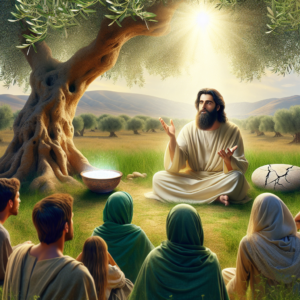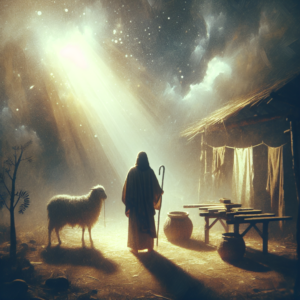Spiritual Devotional about Spirituality vs. Religion
Spirituality vs. Religion: Finding the Divine Connection
Hello dear friends!
It’s a beautiful day to explore the profound mysteries of our inner selves and the universe around us. As we walk this journey of faith and love, it’s essential to understand the distinctions and connections between spirituality and religion. Many of us have pondered these concepts and their meanings in our lives. So, let’s dive deeply into this enlightening topic with an open heart and mind.
Religion: The Structural Support for Our Faith
Religions have been around for millennia, shaping cultures, communities, and individual lives. They provide a structured framework for our beliefs, practices, and rituals, offering us a connection to the divine through established traditions. For many, religion is the bedrock of their spiritual journey.
In Christianity, for example, the Bible offers a wealth of knowledge and guidance. From the Ten Commandments to the teachings of Jesus Christ, it’s rich with principles to live by. The church, as an institution, also plays a crucial role in nurturing fellowship and providing a sense of community.
Consider Hebrews 10:25 (NIV): "Let us not give up meeting together, as some are in the habit of doing, but encouraging one another—and all the more as you see the Day approaching." This verse highlights the importance of coming together in faith, an essential aspect of religion.
Spirituality: The Personal Relationship with the Divine
On the other hand, spirituality is deeply personal and often transcends structured practices. It’s about an individualized relationship with the divine, fostering a direct and intimate connection with the sacred. While religion can guide our spiritual practices, spirituality allows us to experience God’s presence in a highly personal way.
Jesus emphasized the importance of this personal relationship. In John 4:24 (NIV), He said, "God is spirit, and his worshipers must worship in the Spirit and in truth." This verse calls us to connect with God sincerely and intimately, beyond the limitations of religious structures.
The Harmony Between Spirituality and Religion
What becomes clear is that spirituality and religion do not have to exist in opposition. Instead, they can complement and enrich one another. Religion can provide the structure and community support, while spirituality deepens our personal connection with God.
The Apostle Paul beautifully blends these concepts in Romans 12:2 (NIV): "Do not conform to the pattern of this world, but be transformed by the renewing of your mind. Then you will be able to test and approve what God’s will is—his good, pleasing and perfect will." This transformation can be nurtured by religious practices and deepened by our spiritual pursuits.
Finding Your Path
As you reflect on your spiritual journey, remember that both religion and spirituality offer unique and valuable contributions. Embrace the structured guidance and community that religion provides, while also seeking personal encounters with the divine.
Engage with your local church, read and meditate on Scripture, and find moments of quiet to listen for God’s voice. Whether through prayer, meditation, or acts of kindness, allow your spirit to soar with the knowledge that God walks with you every step of the way.
May your heart be filled with joy and peace as you explore the divine in both structured and personal ways. Let your journey be one of growth, faith, and love, knowing that you are always deeply connected to God, who is both immanent and transcendent.
Stay blessed and inspired,
[Your Name]
Explore and dig up answers yourself with our BGodInspired Bible Tools! Be careful – each interaction is like a new treasure hunt… you can get lost for hours 🙂
Q&A about Spirituality vs. Religion
Q: What is spirituality?
A: Spirituality is a broad concept that typically involves the search for meaning, purpose, and connection to something greater than oneself. It often includes personal growth, a sense of peace and well-being, and the exploration of existential questions. Spirituality can be practiced individually or within a community and does not necessarily require adherence to a specific set of beliefs or rituals.
Q: How does religion differ from spirituality?
A: Religion is a structured and organized system of beliefs, practices, and rituals that often centers around the worship of a higher power or deity. It usually involves a community of followers and a formal doctrine or creed. While spirituality is more individual and personal in nature, religion provides a collective framework and shared practices for understanding and experiencing the divine.
Q: Can one be spiritual without being religious?
A: Yes, one can be spiritual without being religious. Many people identify as spiritual but not religious (SBNR), seeking personal growth and connection to a higher power or the universe without adhering to the doctrines or practices of an organized religion. They may explore spirituality through meditation, nature, personal reflection, or other practices beyond traditional religious settings.
Q: Can one be religious without being spiritual?
A: It is possible for someone to follow the rituals and outward practices of a religion without necessarily experiencing personal spiritual growth or connection. For some individuals, religious observance may be more about cultural identity, social belonging, or adherence to family traditions than about personal spirituality.
Q: What are some common practices of spirituality?
A: Common practices of spirituality include meditation, mindfulness, yoga, prayer, journaling, spending time in nature, and engaging in acts of kindness and service. These practices aim to foster a sense of inner peace, connection, and understanding.
Q: What role do community and tradition play in religion?
A: Community and tradition play a significant role in religion. Religious communities provide a sense of belonging, support, and shared identity among followers. Traditions offer continuity, structure, and a shared set of rituals and beliefs that connect individuals to their religious heritage and to each other.
Q: Are there benefits to identifying as either spiritual or religious?
A: Yes, there are benefits to both. Identifying as spiritual can lead to personal growth, self-awareness, and a sense of connectedness and peace. Being part of a religious community can provide social support, a sense of belonging, moral guidance, and an established framework for understanding life’s big questions. Each path can offer different forms of comfort and fulfillment depending on the individual’s needs and beliefs.
Q: How do spirituality and religion address the concept of the divine or a higher power?
A: Both spirituality and religion address the concept of the divine or a higher power, but they do so in different ways. Religions typically have defined beliefs about the nature of the divine, whether it is monotheistic, polytheistic, or another form, and they often have scriptures or teachings that describe the divine. In contrast, spirituality is often more flexible and personal in its understanding of the divine, which might include God, the universe, higher consciousness, or a universal spirit, and it allows for a more individualized interpretation of what the divine means.
Q: Can spirituality and religion coexist?
A: Yes, spirituality and religion can coexist. Many religious individuals also see themselves as spiritual, finding personal meaning and spiritual growth within the frameworks of their religious beliefs and practices. In this way, spirituality can deepen their religious experience, making it more personal and fulfilling. Conversely, spirituality can benefit from the moral, ethical, and communal structures provided by religion.
Q: How does the modern world influence the distinctions and connections between spirituality and religion?
A: The modern world, with its diverse cultures, rapid exchange of information, and scientific advancements, has influenced the distinctions and connections between spirituality and religion. There is greater exposure to various beliefs and practices, leading to more individualized and eclectic spiritual paths. Technology and global communication facilitate the sharing of spiritual and religious ideas, while also allowing for the critique and reinterpretation of traditional beliefs. This dynamic environment encourages people to explore both spirituality and religion in ways that are meaningful to them, often blending aspects of both.
This Q&A provides a clear understanding of the distinct yet interconnected concepts of spirituality and religion and their relevance in contemporary life.


